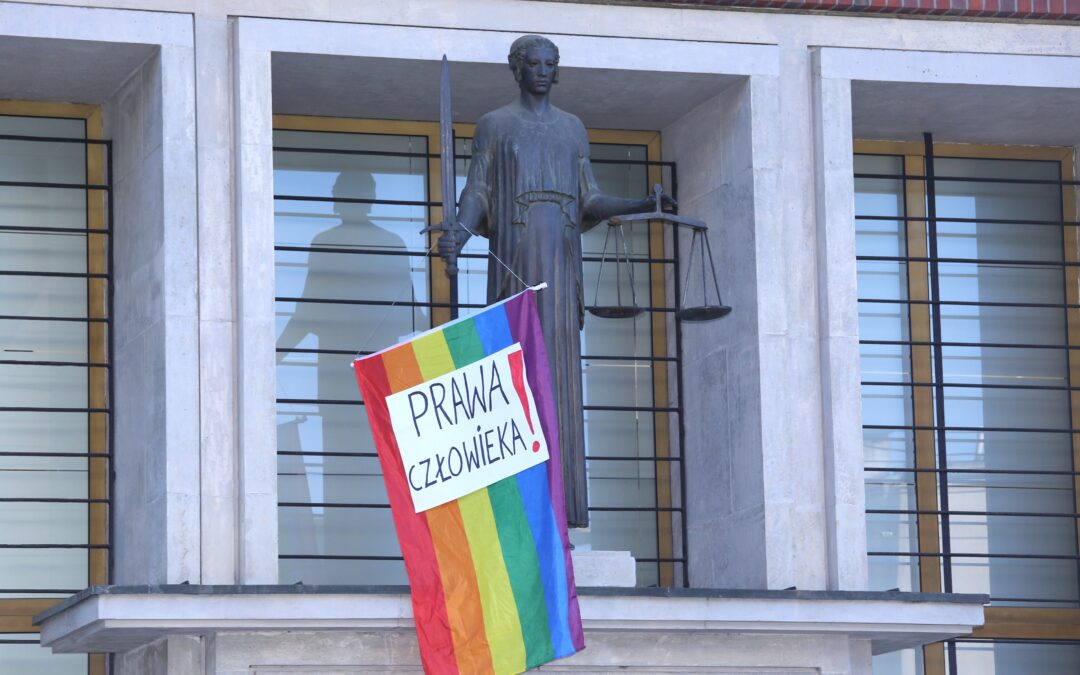Marriage, being a union of a man and a woman, as well as the family, motherhood and parenthood, shall be placed under the protection and care of the Republic of Poland.
Poland’s highest administrative court has announced that it will ask the Court of Justice of the European Union (CJEU) to issue a ruling on whether same-sex marriages conducted in another member state should be recognised in Poland even though Polish law does not allow for such unions.
The decision by the Supreme Administrative Court (NSA) is groundbreaking, as up until now Polish courts have refused to refer such cases to the EU level.
🌈Czy Polska ma prawo odmawiać uznania małżeństwa pary jednopłciowej zawartego za granicą? O to NSA pyta TSUE! „Mamy realną szansę, by w polskim porządku prawnym pojawił się pierwszy akt małżeństwa pary osób tej samej płci”. 🌈
Czytaj w @oko_press: https://t.co/9caAKv27rx— Agata Kowalska 🏳️🌈 (@AgataKowalskaTT) November 14, 2023
The case in question was brought by two men – one a Polish citizen, the other a dual Polish-German national – who married in Berlin. When they sought to have their union recognised in Poland, they were refused, first by the registry office and then by courts, which cited article 18 of Poland’s constitution.
That article states: “Marriage, being a union of a man and a woman, as well as the family, motherhood and parenthood, shall be placed under the protection and care of the Republic of Poland.”
Opponents of same-sex marriage have argued that this means marriage is constitutionally defined as being exclusively between a man and a woman. However, proponents say that it only puts such marriages under the protection and care of the state, without prohibiting other types of unions.
Poland’s highest administrative court has ruled that same-sex marriage is not barred under the constitution, say the gay couple who brought the case.
However, a conservative legal group has dismissed their interpretation as “fake news” https://t.co/CSvBOQ9LB3
— Notes from Poland 🇵🇱 (@notesfrompoland) November 3, 2022
Now the NSA has decided to ask the CJEU for a ruling on whether EU law, by protecting freedom of movement and residence within the bloc, prevents a member state from refusing to recognise marriages concluded in another member state.
The Polish court wants its EU counterpart to issue a so-called preliminary ruling, which is a final determination of EU law on a given issue. If the CJEU makes such a ruling, the national court that requested it is obliged to implement it and there is no scope for appeal.
The lawyer representing the couple, Anna Mazurczak, told legal news service Prawo.pl that the NSA’s decision is a “breakthrough”.
“I have been dealing with such cases for years and I was slowly losing hope for a change in the practice of courts, which consistently refused to ask the CJEU for a preliminary ruling,” she said.
A Polish same-sex couple have lost their long-running effort to have their overseas marriage recognised by Poland’s courts.
They will now take the case to the European Court of Human Rights, arguing that Poland has left them in a "legal vacuum" https://t.co/S6NoWdlhBz
— Notes from Poland 🇵🇱 (@notesfrompoland) December 17, 2022
The lawyer noted that two European rulings in recent years have offered hope for such couples. In 2018, the CJEU issued a ruling against Romania for refusing to grant residency to a non-EU citizen who had married a Romanian in a same-sex wedding conducted in another member state.
And this year, the grand chamber of the European Court of Human Rights (which is not an EU institution) upheld a 2021 ruling by another of its chambers that Russia’s refusal to provide legal recognition of same-sex unions violated the European Convention on Human Rights.
A number of Polish couples have also brought cases to the European Court of Human Rights regarding their country’s refusal to recognise same-sex unions.
In a separate interview with news website OKO.press, Mazurczak said that she believed the CJEU would issue a decision within “a few months, not years”.
Leading opposition figure @RobertBiedron has "married" his partner @K_Smiszek in a symbolic ceremony.
The couple hope that, if their party comes to power at next month's elections, same-sex marriage can be legalised in Poland https://t.co/ZO37utaV5N
— Notes from Poland 🇵🇱 (@notesfrompoland) September 30, 2023
Poland has been ranked as the EU’s worst country for LGBT people for the last four years running in the annual Rainbow Europe index produced by ILGA-Europe, a Brussels-based NGO.
It has noted that the already-existing lack of rights for LGBT people has in recent years been exacerbated by a vociferous campaign by the national-conservative ruling party, Law and Justice (PiS), against what it calls “LGBT ideology”.
However, last month’s elections saw PiS lose its parliamentary majority, making it almost certain that a new government will be formed by a coalition of three opposition groups. The largest of those, the centrist Civic Coalition (KO), has pledged to introduce same-sex civil partnerships.
The smallest coalition partner, The Left (Lewica), also wants marriage equality. The leaders of the more conservative Third Way (Trzecia Droga) have indicated they would support civil partnerships but have rejected the idea of same-sex marriage.
A growing majority of Poles favour the legalisation of same-sex civil unions or marriage, with almost two thirds now in favour, a new poll has found https://t.co/ivS7MswKWi
— Notes from Poland 🇵🇱 (@notesfrompoland) June 10, 2022

Notes from Poland is run by a small editorial team and published by an independent, non-profit foundation that is funded through donations from our readers. We cannot do what we do without your support.
Main image credit: Krzysztof Cwik / Agencja Wyborcza.pl

Daniel Tilles is editor-in-chief of Notes from Poland. He has written on Polish affairs for a wide range of publications, including Foreign Policy, POLITICO Europe, EUobserver and Dziennik Gazeta Prawna.



















